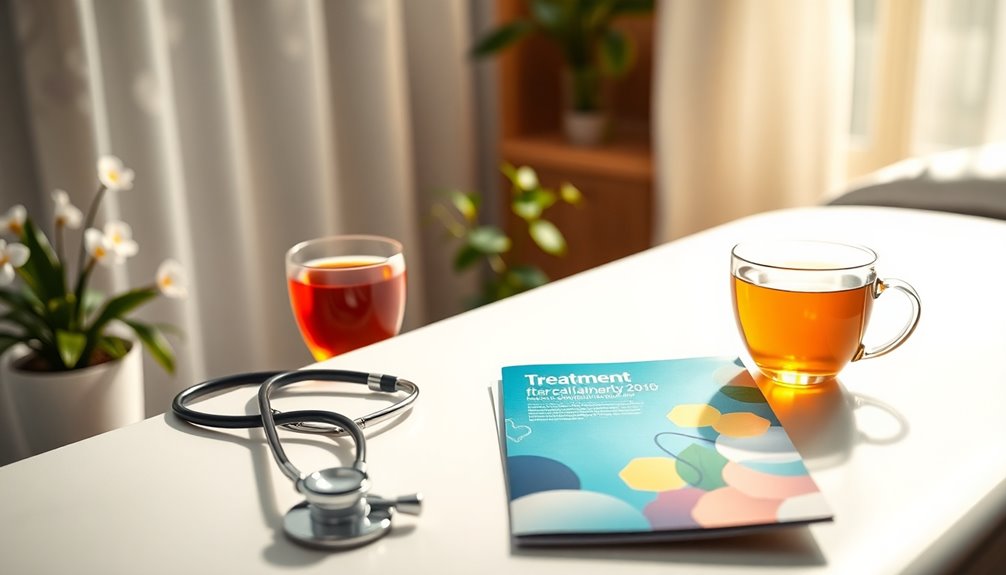You can have sex while dealing with bacterial vaginosis (BV), but it's essential to be aware of some factors. BV isn't a sexually transmitted infection, so it won't pass between partners, but sexual activity might worsen the fishy odor due to changes in vaginal pH. Some women experience no symptoms, while others have discomfort. If you're experiencing significant symptoms or discomfort during sex, it might be wise to consult a healthcare provider. Open communication with your partner is key. If you want further insight on managing BV and its implications, you might find it helpful to explore more.
Key Takeaways
- Engaging in sexual activity with BV is not contraindicated, but comfort and consent between partners are essential.
- BV is not classified as a sexually transmitted infection (STI), so transmission during sex is unlikely.
- Sexual activity may worsen the fishy odor due to changes in vaginal pH.
- It's important to communicate with your partner about any symptoms present to ensure mutual understanding.
- Consult a healthcare provider if symptoms persist or worsen, especially if pregnant, to avoid complications.
Understanding Bacterial Vaginosis

Bacterial vaginosis (BV) is a common condition that arises from an imbalance of the natural bacteria in your vagina. It occurs when anaerobic bacteria, like Gardnerella vaginalis, overgrow, disrupting the typical flora.
While BV is the leading cause of abnormal vaginal discharge, many women mightn't notice any symptoms, making it easy to overlook. This condition isn't classified as a sexually transmitted infection (STI), but risk factors like douching, having new or multiple sexual partners, and using scented products can increase your chances of developing it.
Being aware of bacterial vaginosis is essential, as it can heighten your susceptibility to STIs and lead to complications during pregnancy. Understanding BV helps you take charge of your reproductive health.
Symptoms of Bacterial Vaginosis

While many women may not notice symptoms, understanding the signs of bacterial vaginosis (BV) is essential for effective management. The most common symptoms include:
| Symptom | Description |
|---|---|
| Vaginal Discharge | Thin, grayish-white discharge |
| Odor | Strong, fishy smell, especially after sex |
| Itching or Burning | Mild, occasionally during urination |
| Asymptomatic | Many women experience no noticeable symptoms |
Unlike yeast infections, the discharge is usually non-itchy and doesn't cause irritation. Recognizing these signs helps you seek treatment promptly, especially since BV can be underdiagnosed due to its often subtle symptoms.
Causes and Risk Factors

Understanding the causes and risk factors of bacterial vaginosis (BV) can help you take proactive steps in maintaining vaginal health. BV is primarily caused by an overgrowth of anaerobic bacteria, particularly Gardnerella vaginalis, disrupting the normal vaginal flora.
Here are some key risk factors to take into account:
- Having new or multiple sexual partners.
- Engaging in douching or using scented soaps.
- Experiencing hormonal changes during menstruation or pregnancy.
- Smoking, which may affect the vaginal environment.
Being aware of these causes bacterial can empower you to make informed decisions about your sexual health and hygiene, ultimately reducing your risk of developing BV.
Diagnosis of Bacterial Vaginosis

How can you be sure if you have bacterial vaginosis (BV)? Diagnosis typically starts with a pelvic examination. Healthcare providers use the Amsel criteria, evaluating discharge characteristics, vaginal pH, odor, and the presence of clue cells. Another method, the Nugent scoring system, analyzes vaginal flora through a sample analysis. Accurate diagnosis is crucial since BV shares symptoms with other infections, like yeast infections and STIs. Many cases of BV are asymptomatic, which highlights the significance of routine gynecological check-ups. Additional tests may be performed to rule out other conditions.
| Criteria | Amsel Criteria | Nugent Scoring |
|---|---|---|
| Discharge | Thin, white, or gray | Bacterial count |
| Vaginal pH | > 4.5 | Lactobacillus presence |
| Odor | Fishy after intercourse | Other bacterial types |
| Clue Cells | Present | Score range (0-10) |
Treatment Options for BV

When it comes to treating bacterial vaginosis (BV), antibiotics like metronidazole or clindamycin are often the go-to options, administered either orally or topically for about 5 to 7 days.
Here are some effective treatment options to evaluate:
- Antibiotics: Follow your healthcare provider's prescription for the best results.
- Probiotics: These may help restore vaginal flora, though evidence is mixed.
- Avoiding irritants: Stay away from douches and scented products that can disrupt the balance.
- Monitoring symptoms: Keep track of any recurring symptoms, as about 30% of women may experience them within three months.
Impact of BV on Sexual Activity

When you have bacterial vaginosis (BV), engaging in sexual activity can lead to discomfort during intercourse and may worsen your symptoms.
Additionally, BV can increase your risk of complications, including susceptibility to STIs, making it essential to reflect on your sexual health.
It's important to communicate with your partner and weigh the potential impacts on your relationship.
Discomfort During Intercourse
Experiencing bacterial vaginosis (BV) can considerably impact your sexual activity, often leading to discomfort during intercourse. This discomfort may arise from irritation and sensitivity in the vaginal area, making sex less enjoyable.
Here are some factors to reflect upon:
- BV can intensify the fishy odor during and after intercourse, causing distress.
- While not an STI, sexual activity might disrupt your vaginal flora, leading to recurrent BV episodes.
- Communicating with your partner about any discomfort can help ease anxiety and set realistic expectations.
- Some women prefer to abstain from sex during treatment to avoid discomfort until symptoms fully resolve.
Understanding these aspects can help you navigate your sexual health while managing BV effectively.
Risk of Complications
While engaging in sexual activity during an episode of bacterial vaginosis (BV) might seem manageable, it can lead to several complications that you should consider.
You may notice a worsening of symptoms like discharge and odor, making intercourse uncomfortable. Although BV isn't classified as a sexually transmitted infection (STI), it does increase your risk of getting other STIs.
Additionally, if left untreated, BV can heighten your risk of developing pelvic inflammatory disease (PID), especially when you're sexually active.
Studies show that sexual activity during BV can disrupt your vaginal flora, raising the likelihood of recurrence after treatment.
To guarantee ideal recovery and minimize complications, it's best to consult your healthcare provider about sexual activity during BV.
Preventing Bacterial Vaginosis

To prevent bacterial vaginosis, you should focus on safe sexual practices and maintaining your vaginal health.
Avoid douching and scented products, as they can disturb your natural balance.
Regular hygiene and check-ups also play an essential role in keeping BV at bay.
Safe Sexual Practices
Engaging in safe sexual practices is essential for maintaining vaginal health and preventing bacterial vaginosis (BV).
Here are four key steps you can take:
- Use condoms: They reduce the introduction of new bacteria that can disrupt your vaginal flora.
- Avoid douching: This can alter the natural balance of bacteria, increasing the likelihood of BV.
- Limit sexual partners: Fewer partners help maintain a healthy vaginal environment and reduce exposure to new bacteria.
- Schedule regular gynecological check-ups: Early detection of BV allows for timely management and prevention of recurrences.
Maintaining Vaginal Health
Maintaining vaginal health is vital for preventing bacterial vaginosis (BV), as a balanced vaginal flora plays a key role in overall well-being. To protect yourself, avoid douching and scented products that can disrupt this balance.
Limiting the number of sexual partners and practicing safe sex with condoms can considerably lower your risk of developing BV. Regular gynecological check-ups are essential for early detection and management, ensuring your vaginal health remains ideal.
Additionally, steer clear of irritants like scented soaps and lotions. Consider discussing probiotics with your healthcare provider, as they may help restore normal vaginal flora and reduce BV recurrence.
Implications for Pregnant Women

While bacterial vaginosis (BV) can occur in anyone, pregnant women must be particularly cautious due to the increased risks associated with the condition.
Here are some implications for you to take into account:
- Preterm Delivery: BV may raise the risk of delivering your baby early.
- Low Birth Weight: There's a chance your baby could be born with a lower weight.
- Pelvic Inflammatory Disease (PID): Untreated BV can lead to PID, impacting future reproductive health.
- Treatment Timing: It's generally recommended to treat BV with antibiotics before 20 weeks of gestation to avoid complications.
Safe antibiotics are available during pregnancy, making it essential for you to get screened and treated to protect both your health and your baby's development.
When to Consult a Healthcare Provider

If you suspect you have bacterial vaginosis (BV) or experience any concerning symptoms, it's important to consult a healthcare provider promptly.
Symptoms like unusual discharge or a strong fishy odor warrant an accurate diagnosis and treatment. If your BV symptoms persist or worsen despite being treated with antibiotics, seek medical advice to explore alternative therapies.
Additionally, if you experience recurrent BV—more than twice within six months—it's essential to discuss potential underlying causes with your provider.
Pregnant women must consult a healthcare provider if they suspect BV, as untreated infections can lead to complications, including premature birth.
Finally, if you're uncomfortable during sexual activity due to BV, seek guidance to address both the infection and associated symptoms effectively.
Myths About BV and Sex

What do you really know about bacterial vaginosis (BV) and sexual activity? Let's clear up some myths:
- Avoiding Sex: Many think you should completely avoid sex with BV, but it's generally safe if both partners are comfortable.
- Not an STI: Contrary to belief, BV isn't a sexually transmitted infection, so it isn't directly transmitted through sexual activity.
- Fishy Odor: Engaging in sex may sometimes worsen the fishy odor associated with BV due to changes in vaginal pH.
- Infertility Concerns: Some worry BV causes infertility, but while it can increase susceptibility to STIs, it doesn't directly lead to infertility.
Communication with your partner about any symptoms is key to maneuvering sex with bacterial vaginosis.
Frequently Asked Questions
Can You Pass BV to a Man?
You can't pass bacterial vaginosis (BV) to a man, as it's not classified as a sexually transmitted infection.
While men can carry the bacteria, they usually don't show symptoms and don't need treatment unless they do.
However, engaging in sexual activity while you have BV might cause you discomfort.
It's still essential to practice safe sex, as having BV can increase your susceptibility to other infections.
Stay informed and prioritize your health.
Can You Have Sex While Treating BV?
You might think discomfort means you should stay away from intimacy, but that's not always the case.
While treating bacterial vaginosis, you can have sex, though it's wise to reflect on your comfort. Some choose to wait until symptoms clear.
If you do engage, using condoms can help ease discomfort and reduce infection risks.
Always check in with your healthcare provider to verify it's safe for you, especially if symptoms persist or worsen.
Should I Tell My Partner I Have BV?
Yes, you should tell your partner you have BV.
Open communication fosters trust and helps both of you understand any changes in your health. By discussing it, you can reduce any anxiety your partner might feel about unusual symptoms they could notice.
This transparency encourages them to seek medical advice if needed and allows for discussions about safe sex practices, ultimately promoting better sexual health for both of you.
Can Other People Smell BV?
Yes, other people can smell BV, especially if the fishy odor is strong.
It often becomes more noticeable after sexual activity or during menstruation. While you mightn't notice the smell yourself, your partner or others could find it offensive.
If you're concerned about the odor, addressing BV with appropriate treatment can help eliminate it and restore your vaginal health, making it less likely to be detectable by others.
Conclusion
To sum up, while having sex with bacterial vaginosis (BV) isn't strictly off-limits, it's best to tread carefully. Engaging in sexual activity can sometimes exacerbate symptoms or lead to complications. You want to keep things smooth sailing, so consider consulting a healthcare provider for advice tailored to your situation. Remember, taking care of your vaginal health is key to enjoying your intimate life without any bumps in the road. Stay informed and prioritize your well-being!










